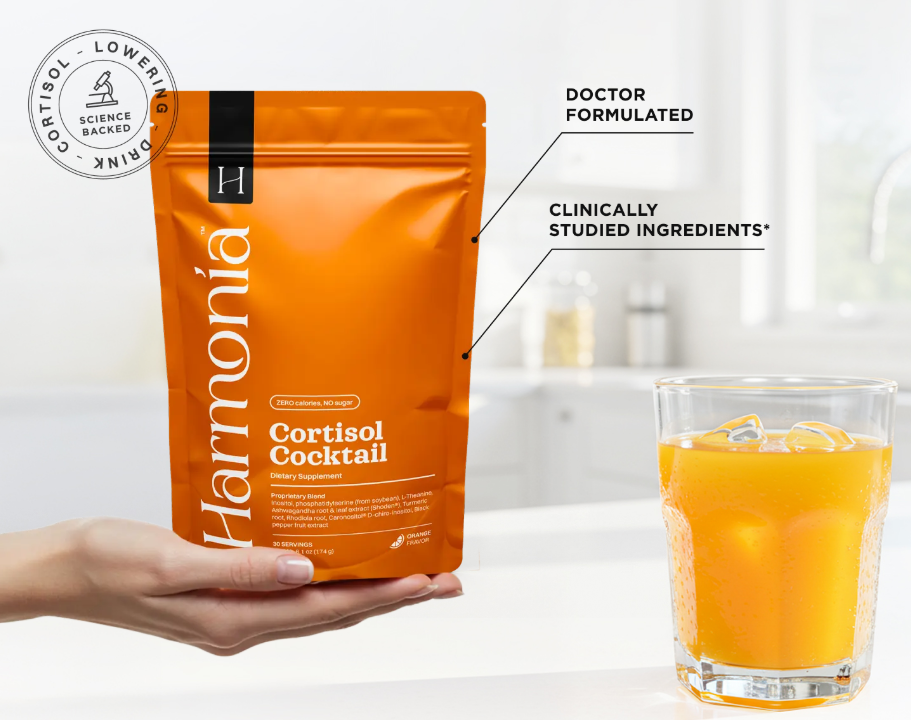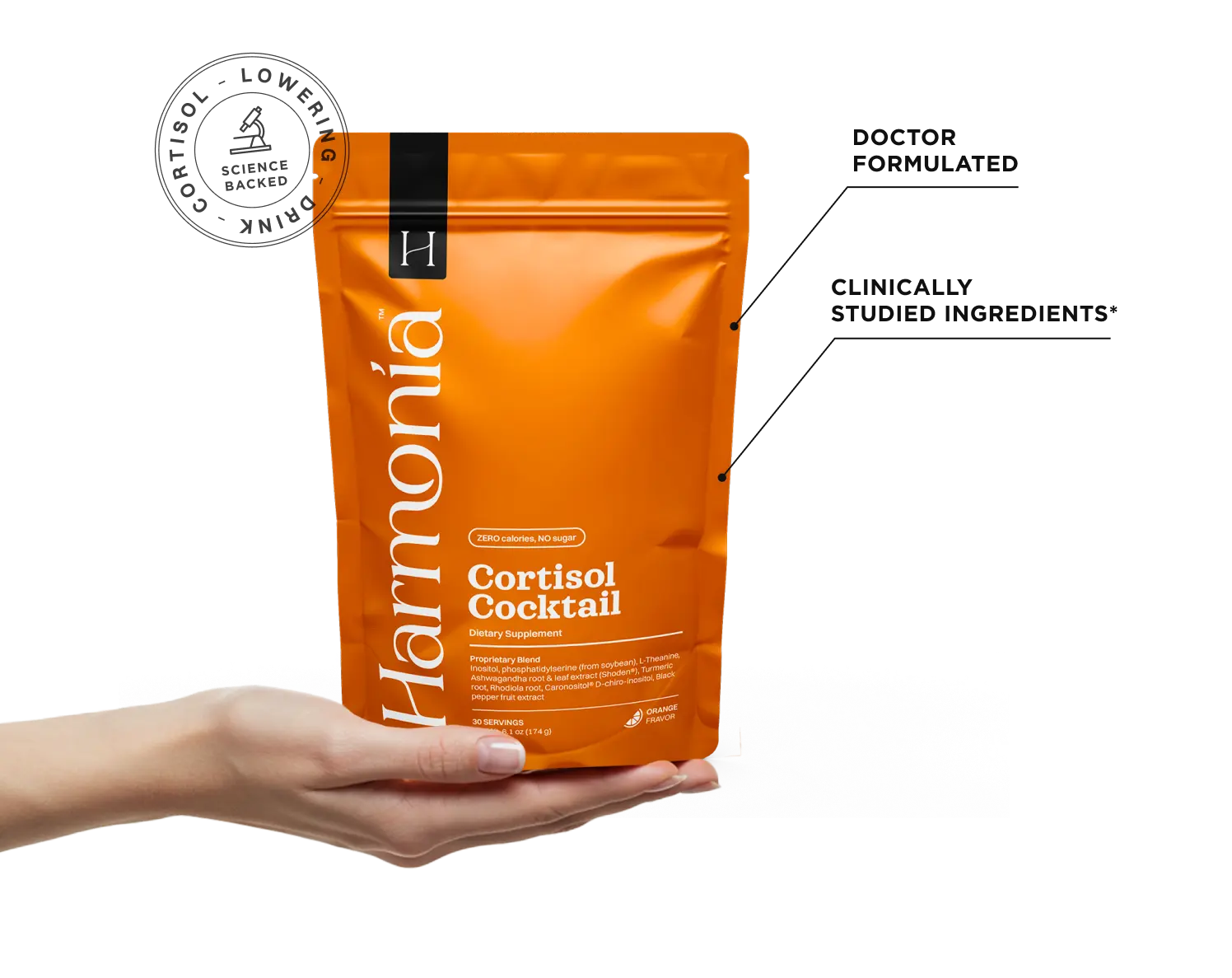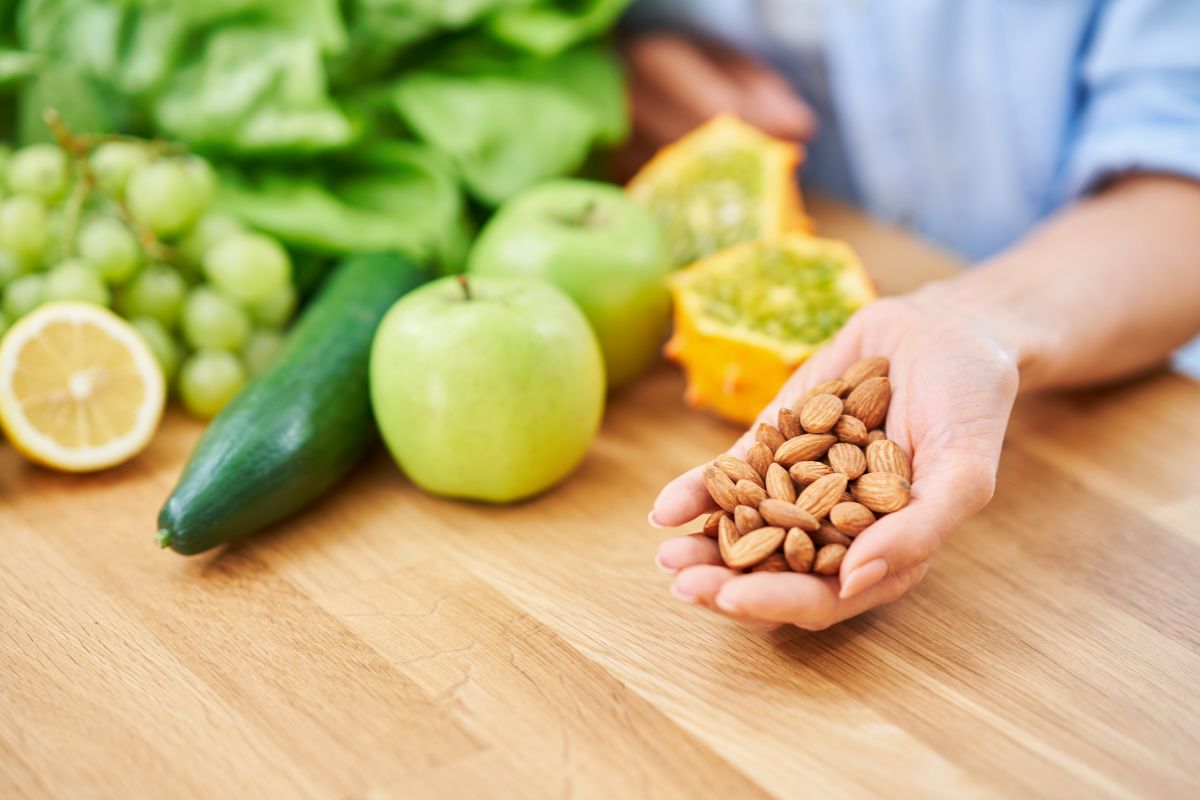Modern life keeps many women in constant motion, leaving little room for recovery. This unrelenting pace elevates cortisol - the body’s main stress hormone - which can quietly disrupt metabolism, sleep, and reproductive health.
For women with Polycystic Ovary Syndrome (PCOS), chronic stress can make symptoms worse by amplifying hormonal imbalances, increasing inflammation, and affecting insulin sensitivity. Research shows that women with PCOS often have higher cortisol levels, suggesting stress plays a major role in how the condition develops and persists.
Understanding how stress interacts with PCOS is essential for restoring balance. In the sections ahead, we’ll explore the science behind cortisol and PCOS, why stress intensifies symptoms, and how natural support can help calm the body and rebalance hormones.
What Is PCOS?
Polycystic ovary syndrome (PCOS) is a complex endocrine and metabolic disorder affecting women of reproductive age. It typically involves:
- Hyperandrogenism (elevated “male” hormones like testosterone)
- Irregular or absent menstrual cycles
- Polycystic appearance of ovaries on ultrasound (many small follicles)
- Insulin resistance and metabolic disruptions
Symptoms vary widely but often include acne, hirsutism (excess body or facial hair), weight gain or difficulty losing weight, fatigue, mood changes, irregular ovulation, and sometimes fertility challenges.
The root causes of PCOS are multifactorial. Genetic predisposition, insulin resistance, environmental and lifestyle factors, and hormonal regulatory dysfunction all play roles. It’s misleading to think of a single "cause" - rather, PCOS represents a system-level dysregulation of metabolism and hormones.
Because PCOS is not a uniform condition, individuals may present very differently. Some lean women have PCOS with minimal metabolic features; others have strong insulin resistance or obesity contributing heavily.
Given this complexity, stress and cortisol may not cause PCOS outright - but they can act as modifiers, triggers, or exacerbating influences in susceptible individuals.
The Science of Stress: How Cortisol Impacts the Female Body

When we perceive a threat - whether physical or psychological - the body activates the hypothalamic-pituitary-adrenal (HPA) axis. The hypothalamus signals the pituitary to release ACTH, which prompts the adrenal glands to produce cortisol.
Cortisol is often called the “stress hormone” because it mobilizes energy, raises blood sugar, supports alertness, and helps us respond to challenges. In short bursts, cortisol is adaptive. The problem arises when stress is chronic, leading to persistently elevated cortisol levels that dysregulate systems across the body.
How Cortisol and PCOS Intersect
In women with PCOS, research suggests that cortisol metabolism and stress-regulation may already be altered. Some key insights:
- Women with PCOS tend to have abnormal cortisol responses or secretion patterns compared to healthy controls, even when controlling for mood factors.
- A study measuring hair cortisol found significantly higher cortisol in women with PCOS versus healthy controls - indicating longer-term elevated cortisol exposure.
- In lean PCOS women, in vivo measurements showed increased production rates of cortisol and androgens.
- Another case-control study found that serum cortisol (and DHEA) levels were significantly elevated in PCOS compared to healthy women.
Together, these findings suggest that PCOS and high cortisol are commonly observed together. That doesn’t necessarily mean cortisol causes PCOS, but that elevated cortisol may amplify the challenges of PCOS, especially in those already vulnerable.
Can Stress Cause PCOS?
From current evidence, it’s unlikely that stress alone causes PCOS in healthy individuals. PCOS has strong genetic, developmental, and metabolic underpinnings that predate stress exposure in many cases.
The capacity for stress to initiate full-blown PCOS in someone without predisposition is not supported by robust human data.
However, stress can act as a trigger or amplifying factor in those who already have risk factors (insulin resistance, hormonal instability, predisposition). In such individuals:
- Chronic stress may push hormonal systems (e.g. HPA axis, gonadotropin signaling) out of balance
- Elevated cortisol can worsen insulin resistance, which in turn can increase ovarian androgen production
- Stress can disrupt ovulatory signaling, further impairing menstrual cycles
- Psychological stressors, mood disruption, and behavioral coping (e.g. emotional eating) often worsen during chronic stress, compounding metabolic and hormonal strain
Thus, a more precise statement is: stress may contribute to worsening or intensifying PCOS symptoms, and perhaps push borderline hormonal instability over a threshold.
Breaking the Cycle: Coping with PCOS and Stress
Because PCOS often involves a feedback loop (stress → worsened hormones → more stress), breaking that cycle is essential. Below are evidence-based, practical strategies:
1. Prioritize Restorative Sleep

Quality sleep is one of the most powerful tools for lowering cortisol and restoring hormonal rhythm.
- Aim for 7-9 hours of uninterrupted sleep per night.
- Keep a consistent bedtime and wake time, even on weekends.
- Limit blue light exposure 1-2 hours before bed and create a dark, cool sleep environment.
- Consider relaxation rituals like herbal tea, magnesium, or guided breathing to ease the transition to rest.
2. Move Your Body Intentionally
Exercise doesn’t have to be intense to be effective. Moderate, regular movement can significantly reduce cortisol and improve mood stability.
- Focus on low- to moderate-intensity activities like yoga, brisk walking, Pilates, cycling, or strength training 3-5 times per week.
- Avoid chronic overexercising, which can increase cortisol and disrupt menstrual regularity.
- Incorporate stretching, breathwork, or short walks during the workday to counteract sedentary stress.
Physical activity enhances insulin sensitivity, supports metabolism, and releases endorphins — all crucial for breaking the PCOS–stress connection.
3. Eat a Hormone-Supportive Diet
Food plays a central role in managing both cortisol and PCOS symptoms. Focus on nutrient density and blood-sugar stability:
- Choose low-glycemic, whole foods - such as leafy greens, cruciferous vegetables, lean proteins, and slow-digesting carbohydrates.
- Incorporate healthy fats (avocados, olive oil, nuts, seeds) and fiber-rich foods to balance blood sugar and reduce inflammation.
- Avoid or minimize refined sugars, processed foods, and inflammatory oils that can spike insulin and worsen hormonal imbalances.
- Space meals evenly throughout the day to prevent energy crashes and cortisol spikes.
Nutrients like magnesium, B vitamins, inositols, and omega-3 fatty acids have shown benefits for mood, stress reduction, and hormonal regulation in women with PCOS.
For many women, it can be challenging to meet all these nutritional needs through food alone - especially when stress disrupts appetite or digestion. That’s where Harmonia cortical cocktail can make a meaningful difference.
Harmonia helps bridge nutritional gaps while promoting healthy cortisol balance. Each ingredient works synergistically to stabilize energy levels, support insulin sensitivity, and ease the hormonal turbulence often linked to PCOS.
4. Rebalance the Mind-Body Connection
Chronic stress keeps cortisol elevated, preventing the body from entering a state of repair. Mind-body practices help reverse this state by calming the nervous system and improving emotional resilience.
- Explore meditation, deep breathing, yoga nidra, or progressive muscle relaxation to quiet the stress response.
- Use journaling or gratitude practices to process emotions and reframe daily stressors.
- Therapy or coaching can be valuable for managing anxiety, body image struggles, or the emotional weight of PCOS.
These practices directly support HPA axis regulation, helping the body shift out of “fight or flight” and into “rest and repair.”
5. Establish Boundaries and Self-Care Rituals
Women with PCOS often juggle multiple roles, leading to burnout and emotional fatigue. Setting boundaries is an act of hormonal self-care.
- Learn to say no to unnecessary commitments that drain energy.
- Schedule short, restorative breaks throughout your day - even 10 minutes of quiet time can lower cortisol.
- Engage in activities that bring calm and joy, like reading, art, time outdoors, or music.
These intentional pauses help regulate cortisol levels and restore nervous system balance.
6. Build Support and Connection
PCOS can feel isolating, but social connection is a powerful antidote to stress.
- Join support groups or online communities for women managing PCOS.
- Seek out a nutritionist, therapist, or health coach familiar with hormone health.
- Share your experience with trusted friends or family - emotional validation can lower perceived stress and strengthen resilience.
Human connection triggers the release of oxytocin, a hormone that counterbalances cortisol and promotes feelings of safety and calm.
How Harmonia Supports Women with PCOS, Cortisol, and Stress Naturally

Managing PCOS and chronic stress is a holistic journey - and that’s where Harmonia’s Cortisol Cocktail can play a strategic role as a scientifically-informed support. Here’s how:
- Supports healthy cortisol balance and stress resilience through adaptogens like Ashwagandha and Rhodiola Rosea
- Enhances hormonal regulation via Myo-Inositol and D-Chiro Inositol, supporting insulin sensitivity and ovarian function
- Improves sleep, mood, and calmness via L-Theanine, phosphatidylserine, and calming botanicals
- Boosts nutrient support (magnesium, B-vitamins, vitamin D, etc.) to back overall endocrine and metabolic health
- Reduces tension and emotional reactivity, helping break the stress-PCOS feedback loop
By integrating Harmonia cortisol cocktail into your broader lifestyle and wellness strategy, you can better lower cortisol in PCOS and support sustainable hormonal balance.
If you’re curious how Harmonia’s personalized formula might work for you, take the quiz to uncover your stress-hormone profile and get tailored guidance.
References
- Benjamin, J. J., MaheshKumar, K., Radha, V., Rajamani, K., Puttaswamy, N., Koshy, T., ... & Padmavathi, R. (2023). Stress and polycystic ovarian syndrome-a case control study among Indian women. Clinical Epidemiology and Global Health, 22, 101326. Link.
- Gonzalez, D., Maidana, P., Ibar, C. et al. Hair cortisol in polycystic ovary syndrome. Sci Rep 12, 10309 (2022). Link.
- Farrell, K., & Antoni, M. H. (2010). Insulin resistance, obesity, inflammation, and depression in polycystic ovary syndrome: biobehavioral mechanisms and interventions. Fertility and sterility, 94(5), 1565-1574. Link.
- Pasquali, R., & Gambineri, A. (2012). Cortisol and the polycystic ovary syndrome. Expert Review of Endocrinology & Metabolism, 7(5), 555-566. Link.
- Tsilchorozidou, T., Honour, J. W., & Conway, G. S. (2003). Altered cortisol metabolism in polycystic ovary syndrome: insulin enhances 5α-reduction but not the elevated adrenal steroid production rates. The Journal of Clinical Endocrinology & Metabolism, 88(12), 5907-5913. Link.







